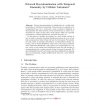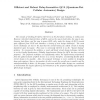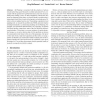139 search results - page 6 / 28 » How Common Can Be Universality for Cellular Automata |
ACRI
2010
Springer
13 years 9 months ago
2010
Springer
Abstract. Network decontamination (or disinfection) is a widely studied problem in distributed computing. Network sites are assumed to be contaminated (e.g., by a virus) and a team...
GEOINFORMATICA
2006
13 years 7 months ago
2006
This paper investigates how portability of a model between different computer operating systems can lead to increased efficiency in code execution. The portability problem is not a...
DFT
2006
IEEE
13 years 11 months ago
2006
IEEE
The concept of clocking for QCA, referred to as the four-phase clocking, is widely used. However, inherited characteristics of QCA, such as the way to hold state, the way to synch...
ALIFE
2005
13 years 7 months ago
2005
We present a new definition of the concept of representation for cognitive science that is based on a study of the origin of structures that are used to store memory in evolving sy...
ECAI
2010
Springer
13 years 8 months ago
2010
Springer
AI Planning is concerned with the selection of actions towards achieving a goal. Research on cellular automata (CA) is concerned with the question how global behaviours arise from ...



